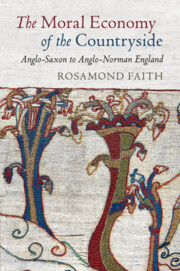Book contents
- Reviews
- The Moral Economy of the Countryside
- The Moral Economy of the Countryside
- Copyright page
- Contents
- Preface
- Abbreviations
- 1 Introduction: The Moral Economy
- Part I Rank
- Part II Reciprocity
- Part III Reputation and Witness
- Part IV The Wolf Sniffs the Wind
- 9 Hwilom Wæs: Archbishop Wulfstan’s Old Social Order
- 10 Land, Law, and Office
- Part V The Aftermath of Conquest
- Part VI In the World of the Manor
- Appendix The Family Farm in Peasant Studies
- Bibliography
- Index
9 - Hwilom Wæs: Archbishop Wulfstan’s Old Social Order
from Part IV - The Wolf Sniffs the Wind
Published online by Cambridge University Press: 25 October 2019
- Reviews
- The Moral Economy of the Countryside
- The Moral Economy of the Countryside
- Copyright page
- Contents
- Preface
- Abbreviations
- 1 Introduction: The Moral Economy
- Part I Rank
- Part II Reciprocity
- Part III Reputation and Witness
- Part IV The Wolf Sniffs the Wind
- 9 Hwilom Wæs: Archbishop Wulfstan’s Old Social Order
- 10 Land, Law, and Office
- Part V The Aftermath of Conquest
- Part VI In the World of the Manor
- Appendix The Family Farm in Peasant Studies
- Bibliography
- Index
Summary
The first part of this chapter draws attention to the elements which show a concern for reciprocal entitlements and obligations in some works associated with Archbishop Wulfstan, arguing that these can more usefully be read as works of morality rather than as estate literature. The second part relates a little-studied remark in his ‘Sermon of the Wolf’ to a context of the proliferation of small lordships, bringing increased pressure on the local peasantry.
Keywords
- Type
- Chapter
- Information
- The Moral Economy of the CountrysideAnglo-Saxon to Anglo-Norman England, pp. 101 - 116Publisher: Cambridge University PressPrint publication year: 2019

